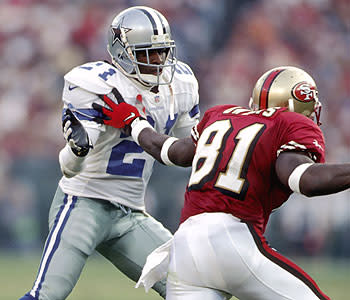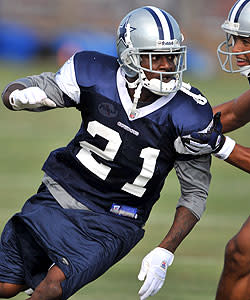Sanders a source of inspiration, advice
Two months ago, as he neared the end of his second offseason as an NFL player, Antonio Cromartie was feeling pretty good about his game. The San Diego Chargers backup turned Pro Bowl cornerback, complete with a league-leading 10 interceptions in 2007 – and postseason picks of Peyton Manning and Tom Brady to boot – believed he knew what it took to reach the top of his profession.
Then Cromartie spent a week in Texas getting critiqued by Deion Sanders, who deconstructed the game of his fellow Florida State alum. Soon, like Chevy Chase, John Belushi and the famed "Saturday Night Live" pioneers of the mid-70s, Cromartie understood he was Not Ready For Prime Time.
"He pointed out a lot of things he'd seen me doing wrong," Cromartie recalls. "He basically just focused on my mistakes. He's a guy who's just going to tell you how it is. He's not going to sugar-coat anything."

Sanders against then-49ers WR Terrell Owens.
(US Presswire)
As outstanding as Sanders was during his decorated playing career – he'll be a first-ballot Hall of Famer once he's eligible in 2011 – his influence on football has never been greater. By serving as a mentor to some of the NFL's most dynamic players, a group that also includes Chicago Bears wideout and return man extraordinaire Devin Hester, Oakland Raiders cornerback DeAngelo Hall and Dallas Cowboys corner/return man Adam (Don't Call Me Pacman) Jones, Sanders is attempting to establish a lasting legacy of, in his words: "players who do things the right way, on and off the field."
Sanders, 41, isn't merely another retired player who shows up in a TV studio on Sundays and talks about the game. In many ways, he still lives it. Whether he's sending motivational text messages to his many disciples on Saturday nights, breaking down game tapes on Monday afternoons or hosting an unofficial Camp Deion – as he did for Cromartie, Jones, Raiders cornerback Chris Johnson and Bills draft pick Kendrick Cox in July – Sanders is heavily involved.
"There's not a day that goes by when I don't get a call from some (player) about a crisis or a fire that needs to be put out, or from someone who needs to be encouraged," Sanders says. "I do it because that's my calling. I see these guys improving every day, not only in football but in life, and it makes me proud.
"That's who I am. That's who I've always been. I've always helped guys. If you want it, I've got it."
"Neon Deion" was viewed suspiciously by veterans upon entering the league with the Atlanta Falcons, who drafted him fifth overall in 1989, and his simultaneous run as a part-time major league baseball player increased many people's perception that he wasn't overly serious about football. One Falcons teammate in particular, veteran cornerback Bobby Butler, actively mentored Sanders – a gesture that helped push the young player into the starting lineup at Butler's expense. Sanders was so touched that he promised himself he would always make himself available to do the same and went about acquiring a vast base of knowledge he credits for much of his success.
Probably the best coverage cornerback ever, Sanders won a pair of Super Bowls (for the 49ers in '94 and the Cowboys in '95), earned eight Pro Bowl invitations, intercepted 53 passes and scored 22 touchdowns in five different ways – kickoff, punt, interception and fumble returns and as a receiver. He also ran for a postseason touchdown.
The fact that many of Prime Time's memorable runs included ostentatious high-stepping and other overtones of showboating obscured the careful attention to his craft that made such antics possible. "What was behind the flash was never reported," Sanders says, "so people didn't know what it took to get to that level. I was always working on my game. The flamboyance came after the substance."
After the week Cromartie spent with Sanders this past July, the third-year corner began to understand. Camp Deion included two-a-day practice sessions focusing on technique and other fundamentals and numerous film sessions during which Sanders broke down game tapes of each player and highlighted the areas in which improvement was needed.
"Ask (Cromartie) and Adam," Sanders says. "I let it rip. I don't pacify 'em. I pick their games apart. In (Cromartie's) case, it was things like, 'You're too high (in your stance). You're not looking at the down or distance; you don't even know what's going on out there. You're just coasting on ability.' I don't want 'em to just play the game. I want 'em to know the game."
Cromartie recalls that Sanders introduced him to the concept of "playing mind games with the quarterback and receivers. You never want to show the same thing out there. You keep 'em guessing. When you're messing with the quarterback, it makes the game a whole lot easier and that much more fun."
Another Sanders tenet: Don't just study receivers; learn about the offensive coordinators you'll face and the offensive philosophies they espouse.
"I encourage these guys to keep files on everyone, especially coordinators," Sanders says. "Receivers will come and go, but Norv Turner's going to be in the league till kingdom come. I say, 'Think about the West Coast Offense – so many teams run it, so let's start knowing this system.' "
Cromartie is among the many players who were approached by Sanders long before they became NFL stars. Sanders reached out to Cromartie after the young corner suffered a serious knee injury heading into what would have been his junior season at Florida State and unsuccessfully tried to convince him not to declare for the following spring's NFL draft. Sanders made a point of meeting Hester, then a University of Miami cornerback, after reading that he was one of Hester's idols. He introduced himself to Hall, a Virginia Tech cornerback and talented return man whose abilities caught Sanders' eye; the two became even closer after the Falcons selected Hall in the first round of the '04 draft and he wore No. 21 to honor Sanders.
Two years ago, as it looked like Hall was on the verge of becoming a superstar, the young cornerback was brutalized by Steelers wideout Hines Ward (eight catches, 171 yards, three touchdowns) in an October game at the Georgia Dome. Sanders, watching from a TV studio in Los Angeles, could barely hide his disgust. "He's getting his butt kicked," Sanders said. "This kid has so much talent, but I don't think he knows how good he can be, or what being the best entails. I can't wait to call him tonight and tell him what I see. I'll say, 'There's nobody on that team that can run by you, so why are you playing off? You've got to play to your strengths.' "

A Cowboys corner wearing No. 21? Looks familiar.
(US Presswire/Kirby Lee)
Of all the players with whom Sanders has shared his wisdom – and the lengthy list includes Bengals wideout Chad Johnson, Broncos cornerback Champ Bailey, newly signed Patriots cornerback Deltha O'Neal, Browns wideout Donte' Stallworth, Browns halfback Jamal Lewis and Vikings running back Chester Taylor – the one currently receiving the most attention is Dallas' new cornerback. Jones, recently reinstated by NFL commissioner Roger Goodell after a season-long suspension for violating the league's personal conduct policy, has grown especially close to Sanders since being traded to the Cowboys in April. The two live about a block from one another in Prosper, Texas, and Sanders says, "Pacman is not like a friend to me. Adam is like a son to me."
Jones, whom the Cowboys did not make available for a one-on-one interview, recently asked that reporters no longer refer to him by his Pacman moniker. Sanders says the two of them "talked" about the name issue before Jones made his request.
"Six-and-a-half days a week, I see Adam," Sanders says. "Every now and then, I see Pacman. I'm trying to see more Adam and less Pacman."
Also a talented return man with the potential to play some wideout for the Cowboys, Jones caught Sanders' attention long before the trade, when he was the regular recipient of police questioning while with the Titans. "I saw an arrow pointed in the wrong direction," Sanders said. "That was it. And if I could help to re-aim him and refocus him, I was going to try."
Sanders lectures his many protégés on parenthood, professionalism and the importance of family with the knowledge that he, too, was far from perfect during his playing days. Though not engaged in criminal activity, Sanders had a messy divorce from his first wife, Carolyn, in 1996. He has since remarried Pilar Biggers; the two were recently featured on an Oxygen reality show, "Deion and Pilar: Prime Time Love."
"It's hard to give a guy millions and expect him to mature," Sanders says. "Money makes you think you're more than who you are. There's a scripture that says, 'When I was a child … I thought as a child. But when I became a man, I put away childish things.' It took me until I was the age of 30 before I put away these things. How can I be critical of these guys?"
Sanders has also made a point of connecting with players in high school or college in an effort to prepare them for the challenges of a possible pro career. He counseled current West Virginia running back Noel Devine, who starred at Sanders' alma mater, North Ft. Myers High School, during the college recruiting process. At one point, Sanders attempted to become the legal guardian for Devine, who lost both parents to complications from AIDS by the age of 11, and the running back spent a few weeks living in Sanders' house in Texas.

Hall, using a Deion celebration, while with the Falcons.
(AP Photo/Ric Feld)
On a less personal note, Sanders has turned his mentoring skills into a side business. His "Prime U" training program, designed to get draft prospects prepared for the NFL scouting combine – Sanders plans to extend it to groom high school juniors for collegiate competition – features a program far more formal than that of "Camp Deion" and charges participants a five-figure fee for the privilege.
But the man who once released a somewhat popular rap single called "Must Be The Money" says that, when it comes to mentoring established players like Cromartie, Jones, Hester and Hall, making a buck isn't part of his motivation.
"I don't need anything from these guys," he says. "God has blessed me, man. I'm not looking for a handout; I'm trying to give them a hand up. One day, I'd love for them to pay it back and take some young guys under their wing."
Cromartie, now known as "Crime Time" because Chargers teammate Cletis Gordon decided the interception hawk was robbing opposing quarterbacks who fail to see him lurking (Hester's Bears teammates have dubbed him "Anytime" because he is a constant threat to score), is already on board with Sanders' request.
"Oh, definitely, I'd like to pass it on," he says. "I'm helping out young guys on my team as we speak, and I plan to continue doing that for a long, long time."
He may not be ready for Prime Time, but the kid is getting there – and his mentor couldn't be prouder.

